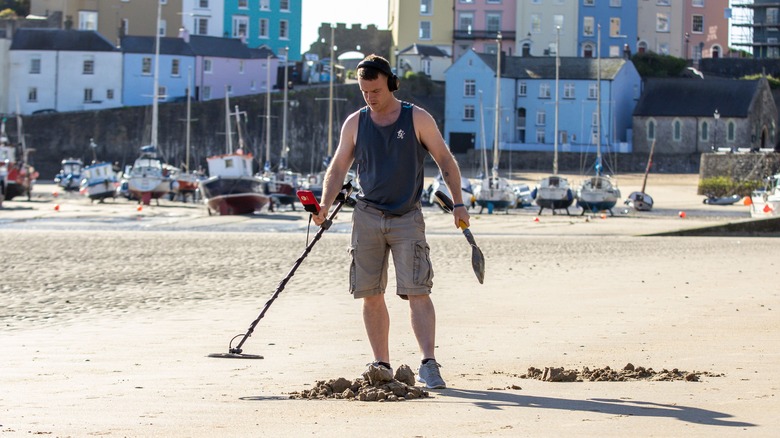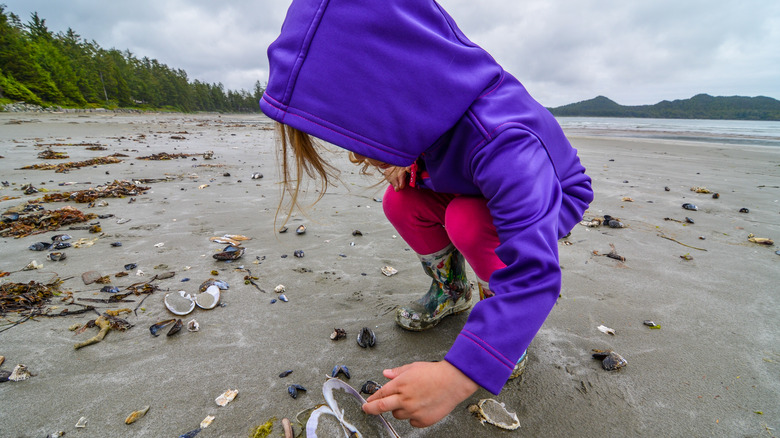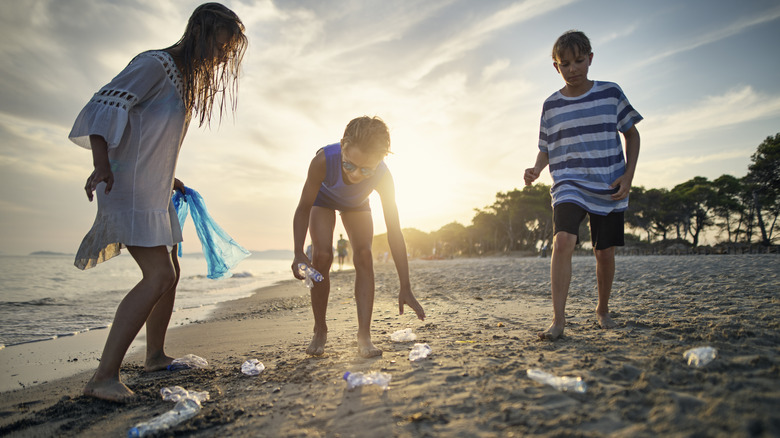The Best Tips For Being A Mindful Beachcomber
If you've ever visited a beach during your lifetime, you have almost certainly engaged in a bit of beachcombing. You probably did it when you were a kid on your beach vacation, strolling hand-in-hand with your parents, collecting shells and interesting stones in a plastic bucket. People have always been drawn to the ocean and fascinated by the treasures that wash up on the sand, and the potential bounty is replenished every time the tide recedes. As with any interaction with a natural environment, it is good to take heed of the do's and don'ts to be a mindful beachcomber.
Beachcombing became known as an activity back in the 19th Century. However, it was more of a necessity for people seeking valuable or semi-valuable items that could help them make a living. In the modern day, some people take it more seriously than others. Some beachcombers just do it for pleasure, finding the combination of walking, sea air, and hunting for interesting trinkets peaceful and meditative. Others have a more creative or business-oriented motive, looking for things to fashion into artwork or curios to sell. Whichever category you fall into, being mindful ranges from cleaning up after yourself to ensuring you don't harm any creatures you find along the way. Here are some great tips to help you avoid the frowns of other visitors and reduce your impact on wildlife and nature.
Be respectful of wildlife and other people
A walk along the seashore can turn up many objects of interest, from driftwood and sea glass to beautiful seashells and fossils. Sometimes, you'll come across creatures that are still alive, and treating wildlife with respect is one of the golden rules of beachcombing. It shouldn't really need saying, but you absolutely must not kill any animals in order to take them away with you. Nor should you remove any living thing from their natural habitat, such as starfish.
Similarly, you should be aware that anything washed up could be a home for numerous creatures, such as clumps of seaweed, and sea shells may still be occupied. Crabs sometimes squat in shells discarded by their original owners. Therefore, even if a shell appears complete with no holes, an aquatic animal may still be inside. It is best to leave sea shells alone in the water to avoid disturbing living creatures. Additionally, breaking off hunks of coral reefs is strongly discouraged and should not be done.
Another important tip is to avoid hoarding everything you find. Some protecting beaches will have restrictions in place to limit the number of objects visitors can take away with them, but it's always best to self-regulate. Leaving some items for others keeps beachcombing sustainable. Just sort through whatever you collect at the end of each visit, select your favorites, and leave the rest.
Leave only footprints and help reduce littering
Discovering artificial objects has always been an aspect of beachcombing since the days when treasure hunters would find the wreckage of ships. The amount of plastics and other trash in the ocean is increasingly becoming a blight on the natural environment and a danger to sea life. A 2023 study published in Plos One indicated that approximately 170 trillion plastic particles were floating on the ocean's surface, and increasingly, it is evidence of humankind that washes up on shorelines.
In a 2021 annual report, the Surfrider Foundation announced they had removed 170,000 pounds of trash from the coastline of the United States alone. To avoid contributing to this immense pollution problem, beachcombers must take a "Leave no trace" approach. These principles mean respecting wildlife and other visitors and minimizing your environmental impact by taking all your garbage away with you.
A survey conducted in 2021 found that cigarette butts, bits of plastic, and food wrappers were the most common things removed by volunteers during beach cleanups of the dirtiest beaches, and it has become increasingly a part of beachcombing etiquette to help in this respect. It's a good idea to take along a bag and pick up litter as you go — you can even download the Tidal Revival app, which rewards users with vouchers for cleaning up plastic waste that they find. With tips like these, beachcombing can be ethical as well as relaxing.


